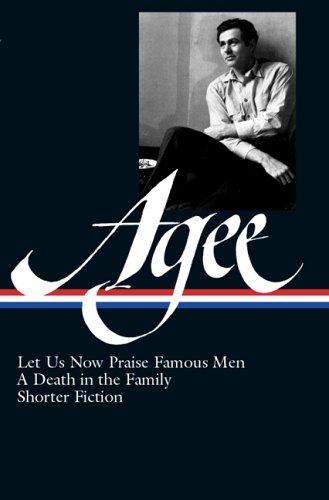Sean reviewed Let Us Now Praise Famous Men by James Agee
Review of 'Let Us Now Praise Famous Men' on 'Goodreads'
No rating
birthday present? anyone?
a death in the family, & shorter fiction (The library of America -- 159.)

818 pages
English language
Published Dec. 19, 2005 by Library of America.
Let Us Now Praise Famous Men is a book with text by American writer James Agee and photographs by American photographer Walker Evans, first published in 1941 in the United States. Let Us Now Praise Famous Men grew out of an assignment the two men accepted in 1936 to produce a Fortune magazine article on the conditions among sharecropper families in the American South during the "Dust Bowl". It was the time of U.S. President Franklin Roosevelt's "New Deal" programs designed to help the poorest segments of the society. Agee and Evans spent eight weeks that summer researching their assignment, mainly among three white sharecropping families mired in desperate poverty. They returned with Evans' portfolio of stark images—of families with gaunt faces, adults and children huddled in bare shacks before dusty yards in the Depression-era nowhere of the deep south—and Agee's detailed notes.
As he remarks in the book's preface, …
Let Us Now Praise Famous Men is a book with text by American writer James Agee and photographs by American photographer Walker Evans, first published in 1941 in the United States. Let Us Now Praise Famous Men grew out of an assignment the two men accepted in 1936 to produce a Fortune magazine article on the conditions among sharecropper families in the American South during the "Dust Bowl". It was the time of U.S. President Franklin Roosevelt's "New Deal" programs designed to help the poorest segments of the society. Agee and Evans spent eight weeks that summer researching their assignment, mainly among three white sharecropping families mired in desperate poverty. They returned with Evans' portfolio of stark images—of families with gaunt faces, adults and children huddled in bare shacks before dusty yards in the Depression-era nowhere of the deep south—and Agee's detailed notes.
As he remarks in the book's preface, the original assignment was to produce a "photographic and verbal record of the daily living and environment of an average white family of tenant farmers". However, as the Literary Encyclopedia points out, "Agee ultimately conceived of the project as a work of several volumes to be entitled Three Tenant Families, though only the first volume, Let Us Now Praise Famous Men, was ever written". Agee considered that the larger work, though based in journalism, would be "an independent inquiry into certain normal predicaments of human divinity"
birthday present? anyone?